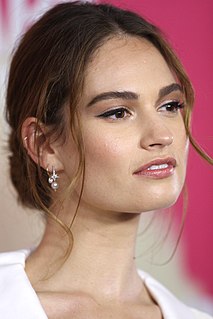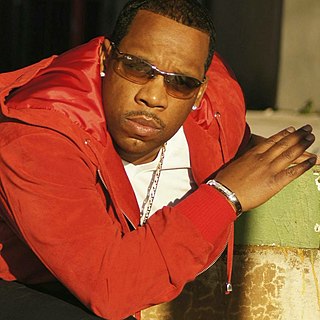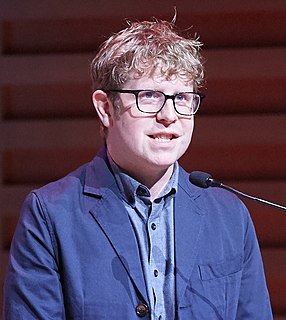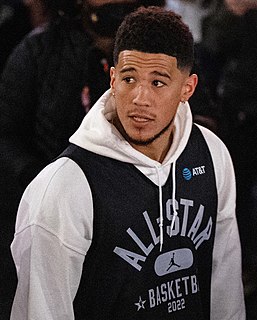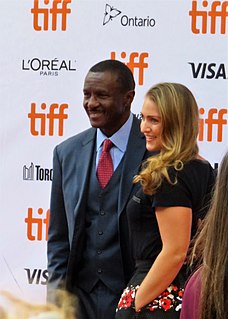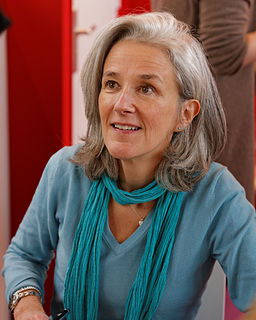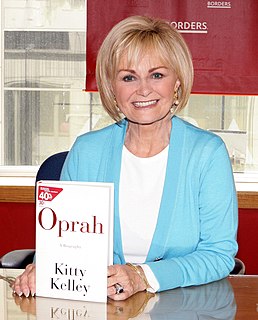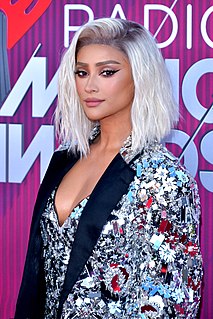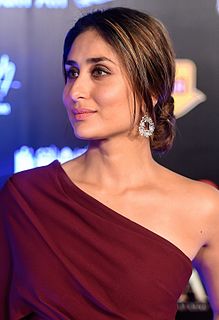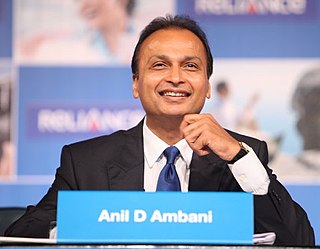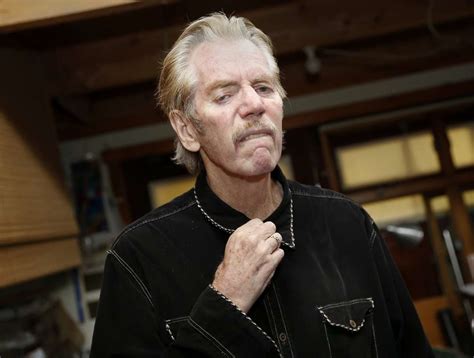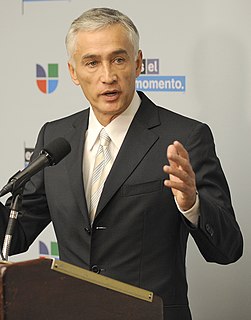Top 1200 Interview Quotes & Sayings - Page 19
Explore popular Interview quotes.
Last updated on April 19, 2025.
The media is all over this Oui interview that Arnold did 25 years ago. Now, he's admitted he smoked pot, had group sex and didn't mind dating a girl that was out of shape and kind of fat if she satisfied him sexually. So, his handlers have stopped comparing him to Reagan and started comparing him to Clinton.
I'm interested is the oblique as a concept deeply connected to human lived experience, not separate from it. I was listening to an interview with film director Stephen Frears on NPR the other day and he said, "People's lives are never what you think they are," or something like that. Human lives are oblique. It makes sense to me that attending to them in language is as well.
I am of the opinion, and even more so the older I get, that it is more difficult to have hope than it is to despair. And I mean this in the sense that in order to have hope you must acknowledge the despair and then you have to get beyond it. Taken from a radio interview given on BBC Radio 4's Open Book
I moved to London when I was 21 and I needed a job. I'd just done a year working in Waterstones in Manchester and I was looking for any old job. This advertisement came up for an editorial assistant on Dora the Explorer Magazine. Because I'd been working in the Children's Department in a bookshop for a year I just nailed the interview.
I don't see the point of doing an interview unless you're going to share the things you learn in life and the mistakes you make. So to admit that I'm extremely human and have done some dark things I don't think makes me unusual or unusually dark. I think it actually is the right thing to do, and I'd like to think it's the nice thing to do.
If you interview five people about the same incident, and you see five different points of view, it makes you know what makes history so complicated. Something doesn't just occur. It's not like a scientific event. It's a human event. So the dimensions of it will be seen differently by different people.
Anger ... it's a paralyzing emotion ... you can't get anything done. People sort of think it's an interesting, passionate, and igniting feeling — I don't think it's any of that — it's helpless ... it's absence of control — and I need all of my skills, all of the control, all of my powers ... and anger doesn't provide any of that — I have no use for it whatsoever." [Interview with CBS radio host Don Swaim, September 15, 1987.]
You could imagine writing about a prostitute, for instance, but if you haven't spent time with prostitutes then you're going to get all these details wrong. But if you have a lot of sex with prostitutes and you're friends with prostitutes and you interview prostitutes, then maybe after many, many years you might be able to create prostitute characters.
With that being said, you are a Democrat. You are saying, "Let's cut and run." And I have to tell you, I have been nervous about this interview with you, because what I feel like saying is, "Sir, prove to me that you are not working with our enemies." And I know you're not. I'm not accusing you of being an enemy, but that's the way I feel, and I think a lot of Americans will feel that way.
Meanwhile, I get to make an album. I feel like I've been very lucky. There is a guilt when I see people I know who work really hard, then I'm like, "Oh, I've got to do an interview today." I'm so appreciative of all of this, but it does feel like the bubble will burst at some point and it will all have been a dream.
I'm doing interviews and there are pictures of my face, so it's not like I'm hiding who I am. As soon as you say what your name is, everybody writes that in every interview, and it kind of annoys me. My name's SOHN. It's not really much more complicated than that, and there are loads of artists in the world who have one-word names. I'd like to somehow be able to close a door somewhere.
In 2014, I knew my English was not so bad, but I had no confidence in talking directly to an English-speaking reporter. I had to do a short interview with, I think, Reuters from France. I was so nervous. I practiced memorizing three sentences for two hours. But, I think that these kinds of interviews make me develop a lot, and that helps me.
Jenny Simpson loses her shoe in the women's fifteen hundred, with a lap and a half to go, destroying her chances to repeat as world champion, and she gives the most gracious interview afterward about how she's had a wonderful career already. Great for Jenny Simpson. Bad for the sport! We need drama!
It's a complicated process being so bilingual. Sometimes it's a mere word or sentence that comes to me, if I'm writing the book in English, in French. It's not always easy to deal with. Sometimes even during an interview somebody can ask me a question in English that I want to answer in French and vice versa - that's the story of my life!
There is a documentary element in my films, a very strong documentary element, but by documentary element, I mean an element that's out of control, that's not controlled by me. And that element is the words, the language that people use, what they say in an interview. They're not written, not rehearsed. It's spontaneous, extemporaneous material. People
In Germany there's something about rock music much more political than it really is - like everything you were doing was an indictment of the American culture. I read an interview with one of the members of Sebadoh. He was saying he had just got back from touring Germany for the first time in five years or whatever, and one of the interviewers asked him, "Why aren't you still relevant?"
One bleeding-heart type asked me in a recent interview if I did not agree that 'violence begets violence.' I told him that it is my earnest endeavor to see that it does. I would like very much to ensure - and in some cases I have - that any man who offers violence to his fellow citizen begets a whole lot more in return than he can enjoy.
I hope they're present in their lives and feel some kind of empathy. I think a lot of the mistakes that have been made in the world have been through a lack of empathy. If you can identify with someone else and empathise with someone else, then activism is a short step away, she explained in an interview with Parade.
We spend a lot of time on Skype and other video interviews, and it's funny how many people will prepare for a Skype interview by wearing a formal suit jacket with pajama pants on the bottom. Then suddenly, someone is at the door, and you have to get up, and you realize you're wearing reindeer boxers. Just put pants on.
I'm reminded of an interview Larry King had on his talk show with one of Michael Jackson's sisters. He's talking about how many millions she made on her latest record, and all of a sudden, she looks at him tearfully and says, "Larry, you know, I'm not interested in money or sales or songs. I'm a spiritual person." And I thought, "Oh my god..."
Fifteen minutes of fame doesn't make a career. An article in a magazine, newspaper, interview on television or multiple print ads may stroke your ego, but nothing much else. An artist's career is a lifetime venture. Just because an artist is on top doesn't mean they are sheltered from a crash. As has been stated, the higher you climb, the harder you fall.
When you are interviewing someone, never let your camera person turn off the camera. The second you turn off the camera, they'll say the magic thing that you'd been looking for the whole interview. People want to relax after the performance is done. Don't be afraid of awkward silence. That is your friend.
I don't know why people feel that I am snooty. I am not a person who has ever given an interview on image building. I have never been that person, as I am very confident of what I do. People do PR, but I get completely foxed. I don't know how to do it. I stay away from the limelight, as I think my work should speak on my behalf.
I'll never forget my interview with Barry Humphries - one of the oddest I've ever done. He insisted that for half the time he appeared as Dame Edna. So I interviewed the real Barry Humphries in a suit and tie, and then I interviewed Edna in full fig in her dressing room, where she criticised Barry mercilessly.
I entered KC College in 1975. When I came here for my interview, for my admission, every person I spoke to spoke to me in Sindhi. Be it Kundanani, Bhambani, Nichani, Kevalramani... and they also thought that Ambani was the same. For a moment, I thought that I got my admission at KC College because I have a 'ni' in my surname.
People call me for interviews on censorship type topics all the time, like that Gannette interview.I don't hold myself out to be an authority on it, but the reason they call me is that they know that I'll at least open my mouth, and give an opinion, whereas other people will play it safe, and won't say anything, because they don't want to offend anybody.
On the eve of long voyages or an absence of many years, friends who are tenderly attached will seperate with the usual look, the usual pressure of the hand, planning one final interview for the morrow, while each well knows that it is but a poor feint to save the pain of uttering that one word, and the meeting will never be. Should possibilities be worse to bear than certainties?
As Mike Bickle said to me, there is a spiritual battle going on in the world, and he believes that in America marriage between a man and a woman will become illegal. He believes there will be a war. He believes it'll begin in schools and the Christian kids will rise up and slay the non-Christian kids. This was an on-camera interview!
One cannot celebrate books sufficiently. After saying his best, still something better remains to be spoken in their praise. As with friends, one finds new beauties at every interview, and would stay long in the presence of those choice companions. As with friends, he may dispense with a wide acquaintance. Few and choice. The richest minds need not large libraries.
I was watching an interview with Martin Scorcese concerning Raging Bull, which is one of my favorite films, and he was talking about how he'd worked with a lot of guys who weren't quote-unquote "actors," like Joe Pesce and Frank Vincent. Scorcese was very smart in the way that he cast, because you don't know where you're going to find the right person who can carry a role and summon that emotion you're looking for.
It is impossible to overestimate the influence of parents who understand the hearts of their children. Research shows that during the most important transitions of life—including those periods when youth are most likely to drift away from the Church—the greatest influence does not come from an interview with the bishop or some other leader but from the regular, warm, friendly, caring interaction with parents.
With the long-format interview, I can get into really interesting conversations with my guests. You know what it's like to get the opportunity to speak to really interesting people and pick their brain about things. To have time to let a guest actually speak and tell a story and get into detail is really exciting.
The Italian journalist Oriana Fallaci used to say that for her, an interview was like a war. I get the sense that we've forgotten that here in the United States. You turn on the TV, and you see very bland interviews. Journalists in the United States are very cozy with power, very close to those in power.
Even somebody like Bill Clinton, who I happen to admire very much, the second he was out of office, I remember, he was interview in Rolling Stone and he said he thought we should have legalized marijuana. And I thought, gosh, if only you were in some sort of position to affect change in the last eight years where you could have done something about that.
In almost every interview someone asks what does HIM stand for. I can't even remember our latest lie about that. When Hanson was hot, we said it means Hanson Is Murder. The name doesn't have a particular history. His Infernal Majesty was a totally different band. I think HIM derives from some death metal joke.
Everybody's always asking me about my blood pressure. They did an interview once where they hooked me up to a blood pressure machine and they'd rile me. I'd yell and scream, and then it would just go back to normal in a few minutes. Everything else is probably rotting, but the blood pressure is spectacular.




